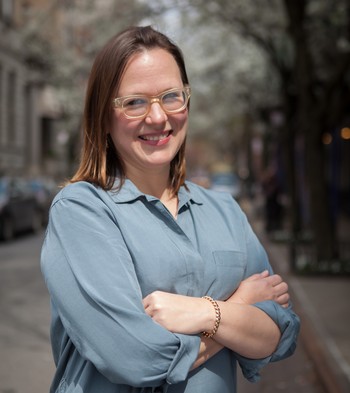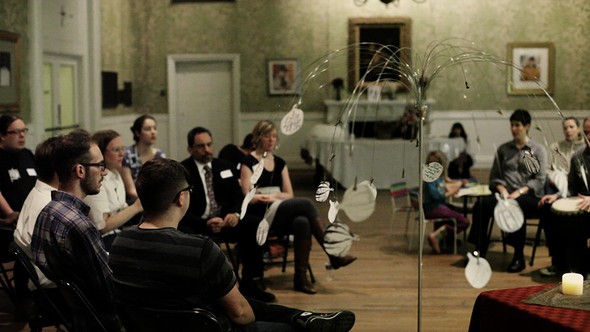Redefining where and when church happens
 The myth of financial self-sustainability
The myth of financial self-sustainability
A plea to share the wealth and support new worshiping communities
by Mieke Vandersall
We don’t like to talk about money in the church. We especially don’t like to talk about how some congregations have more than others. But we need to talk.
Personally I am tired of watching church planters and nonprofit workers, myself included, burning out because of these disparities.
These same church planters and nonprofit workers are fed, until they are starved, on the myth (or even lie) of financial sustainability. When seeking funding we are so often asked, in one way or another, what we are doing to become sustainable, although the definition of sustainability is rarely clarified.
If we are talking about self-sustainability, meaning that our congregants or services pay for themselves, I struggle, on a theological level, with this being a goal at all. We are called to live in community and to share with and support each other so that we can all live into our particular vocations. We believe we are part of one church, one world, one community . . . one body of Christ. None of us is supposed to go it alone. And if we are talking about achieving sustainability through the sharing and redistribution of resources, we are a long way from having that conversation in open, healthy, and honest ways.
On a practical level, I’m not sure I understand what financial sustainability even looks like. I have yet to find anyone in either the nonprofit or the church-planting world who isn’t scrambling to make ends meet, wasting precious energy and time along the road to burnout when they could be doing ministry in the world.
I have not met an established congregation—even among the many struggling to make ends meet—that does not have a step up when it comes to financial stability. Here are the things that those of us in entrepreneurial ministries and church plants generally are lacking:
1) A gathering place. Sometimes, for congregations, it isn’t a very nice place, but it is a place nonetheless. It is your place; you don’t have to share it with anyone else.
2) Rental income. Perhaps this is a particular New York City phenomenon but congregations I know make a significant portion of their budget through rental income.
3) Endowments. Enough said.
4) Established, long-term donors, and bequests from those who pass away.
5) Buildings. I realize that buildings can be a real problem for congregations, because they take so much money to maintain, but to have a building means that you can do something with it. Not only can you meet there and rent it out, but you can also sell it and use the proceeds to buy something smaller, more ecologically sustainable, and creative.
The Center for Progressive Renewal wrote a report stating that financial viability takes time for new congregations, even up to eight or 10 years. “Expectation of viability in one, three or even five years may be unrealistic and may create unfairly negative assessments of new ministries,” the Center reports. “Communities comprised of younger people with fewer financial resources will take [even] more time to become financially viable.” And communities in impoverished and oppressed areas may long need the support of more affluent congregations—at least until the underlying causes of the poverty are addressed and transformed.

Opening circle during a Not So Churchy worship service
I serve one of these fragile church plants. My community, Not So Churchy, is supported by the 1001 New Worshiping Communities initiative. We are a community of artists, activists, musicians, and families living in New York City. Each gathering is a little bit different, but there is always laughter, and there’s usually chocolate. We have received the two possible years of funding from the denomination, and for that, believe me you, I am very grateful. However, support needs to go further.
Why are resources so scant for church planters? Why is it so hard to find funding, let alone for many years in a row, when we say over and over again how much we want to grow the church?
Let’s be clear. No congregation, no organization is completely sustainable on its own. Not a single one. Traditional, long-term congregations depend on the resources they have developed over generations to pay their bills. And even now those congregations are still looking for new sources. Church plants just haven’t been around long enough to have accrued such resources.
Resources, though, are available. I live in a presbytery where the minimum cash salary and housing allowance for part-time pastors (who, you know, work a lot more than part time) is $33,323 (with benefits, the total is a bit more than $58,000) and the highest paid pastors make, with benefits, between $200,000 and more than $500,000. Taking into account cost of living, that part-time cash salary is comparable to living for a year on $14,000 in Louisville, Kentucky.
This discrepancy is staggering and heartbreaking and points to the available funding that simply isn’t shared. Salaries are only one part of the issue, though. I think of the amount of money that our buildings sit on—money that could be rethought, refocused, and reused. We are resource-rich; there is so very much abundance. But we often have a hard time seeing the abundance before our eyes and learning how to share it.
There are exceptions to this rule. My synod, the Synod of the Northeast, has realized that their resources are actually quite grand, and they are beginning to share them. There is no way that Not So Churchy would be alive today without their generous support. They provide for us a model of how parts of the body of Christ have refocused, reprioritized, and begun living into a new way of being.
I would like to propose that we go back to that value we learned so long ago, that value our parents taught us and that I believe Jesus taught us too. That value is simple: share. We must learn to share more. For the future of the church and for the world, we simply must learn to share, without arduous application processes and with acknowledgement of the many resources we hold in common.
Mieke Vandersall is the founding pastor of Not So Churchy and a fundraising consultant with Wingo, Inc. She lives with her wife and their dog in New York City.